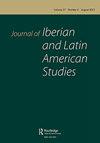“欣赏的教学”:佛朗哥独裁时期的犹太-克里斯蒂亚纳和犹太人在西班牙公共领域的包容
IF 0.3
0 HUMANITIES, MULTIDISCIPLINARY
Journal of Iberian and Latin American Studies
Pub Date : 2023-09-12
DOI:10.1080/14701847.2023.2258007
引用次数: 0
摘要
本文章由计算机程序翻译,如有差异,请以英文原文为准。
“The teaching of appreciation”: the Amistad Judeo-Cristiana and the inclusion of Jews in Spain’s public sphere during the Franco Dictatorship
ABSTRACT Established in 1961 in Madrid, the Amistad Judeo-Cristiana strove to promote a dialogue between Catholic and Jewish Spaniards. The article accounts for the Amistad’s origins and its development, explaining the critical impact of the Second Vatican Council, which allowed for the eventual formal recognition of Madrid’s Jewish community by the Franco regime. The support received by a sector of the Spanish ecclesiastical hierarchy permitted the association to embark on a campaign to purge school textbooks from anti-Jewish content, and to condemn blood-libel traditions that were still very much alive in Spanish popular culture. The article argues that the experiences and activities of the Amistad Judeo-Cristiana should be included within the larger historiographical trend that highlights the role played by civil society in helping pave the way for the Spanish transition to democracy.
求助全文
通过发布文献求助,成功后即可免费获取论文全文。
去求助
来源期刊

Journal of Iberian and Latin American Studies
HUMANITIES, MULTIDISCIPLINARY-
CiteScore
0.40
自引率
33.30%
发文量
23
 求助内容:
求助内容: 应助结果提醒方式:
应助结果提醒方式:


